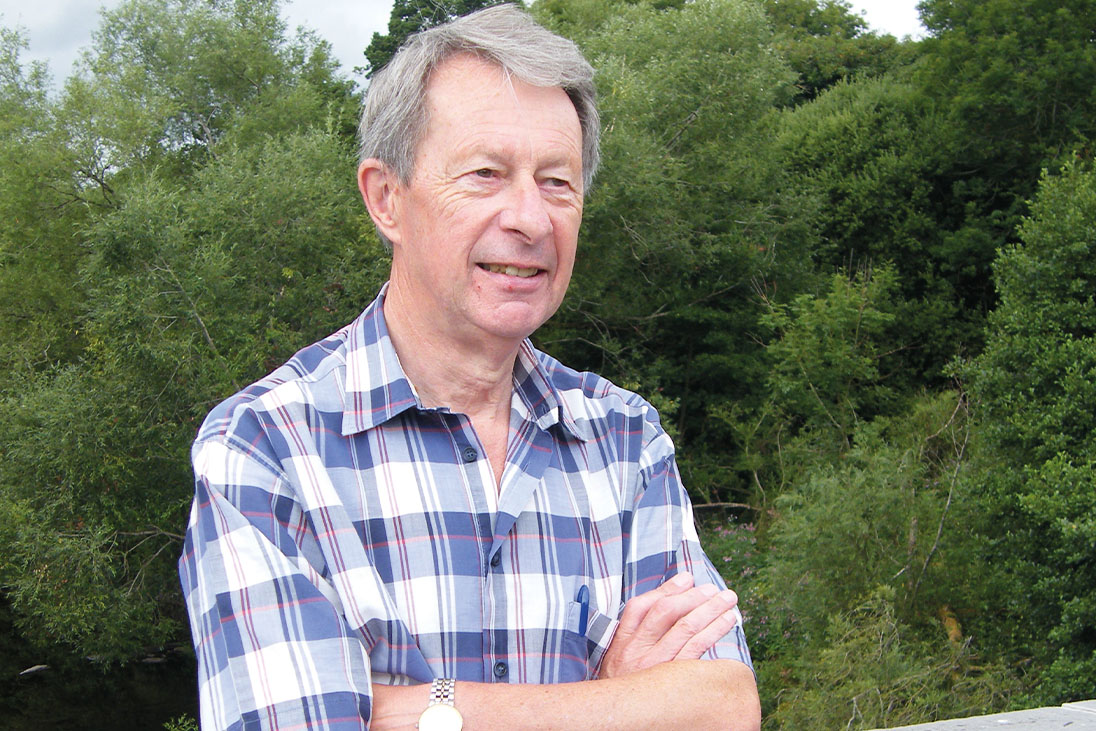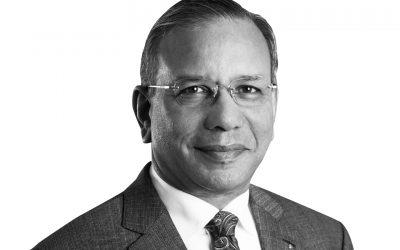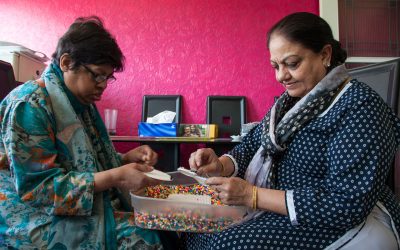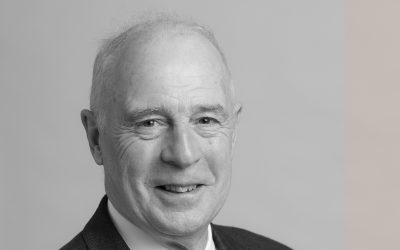These are challenging times to be starting a new job. Moreso, when you’re at the helm of a huge organisation, with 43,000 members, and you’ve got just 12 months to prove your worth.
But that’s precisely the challenge facing Tom Griffin, who in July became the latest, and last, President of Rotary in these isles.
The very first President of the British Association of Rotary Clubs, a title which did not please the Irish clubs, was R.W Pentland from the Rotary Club of Edinburgh, who took over in 1914, on the eve of the First World War.
Tom, another Scotsman, faces an equally epic task to resurrect Rotary in the midst of the COVID-19 global pandemic. And he admits he has mixed feelings.


Tom Griffin, who in July became the latest, and last, President of Rotary in these isles.
“The difficulty is, we don’t know what is going to happen,” reflected Tom.
“Apart from the obvious potential consequences from COVID-19 on an organisation whose average age is about the same as mine, clubs and districts are having to meet in a different way, some clubs are not meeting at all.
“Therefore, we may lose a significant number of members.”
However, Suffolk-based Tom, who is a member of Woodbridge Deben Rotary, just outside of Ipswich, acknowledges that now is a time of opportunity. He pointed to the three-quarters of a million people who have volunteered for the NHS during COVID-19.
And he highlighted the wealth of community groups which have sprung up to support the vulnerable – such as collecting shopping and prescriptions, as well as simple befriending.
“Suddenly we have realised the desire to volunteer remains strong,” added Tom.
“Rotary has been very poor at recruiting younger people. We have made excuses that people are not interested in service organisations any more.
“Yet the number of people who are coming forward volunteering in the current crisis rubbishes that idea.
“So why are we not tapping into them? Because our model is the 1905 model, when Rotary was first founded.
In the first instalment of his monthly, online blog, @RotaryGBI President Tom Griffin looks back at his first month in the role, and it's fair to say it has been different to what he expected!https://t.co/9Avoar8uB8#RotaryResponds | #PeopleOfAction
— Rotary GB & Ireland (@RotaryGBI) July 31, 2020
“We expect Rotarians to network, to socialise the way people networked and socialised in 1905. Times have changed, yet we still expect that.
“Every Monday evening you go along, have a meal and listen to a speaker, who may be good or maybe not so good. And all that involves a significant time and cost commitment.
“But, to be a Rotarian, you don’t need that. We’ve seen clubs adapt by meeting online during this crisis.
“So why don’t we do more of that?”
Tapping into the tens of thousands of volunteers who have discovered the value of community service is going to be a tough ask for Rotary.
We expect Rotarians to network, to socialise the way people networked and socialised in 1905. Times have changed, yet we still expect that.”
So what’s in it for them?
Tom believes that Rotary stands apart as an organisation because it can take away the hassle of the bureaucratic side of volunteering – disclosure and barring; insurance, and so on.
He added: “I saw some research recently about millennials asking what are they looking for in their life? And one of those is being part of something bigger which makes a difference.
“The big thing about joining Rotary is that you can be part of a local community organisation doing good in your own locality, but at the same time be part of a worldwide organisation which does good overseas and makes a difference in the second and third world.
“Rotary has two selling points. Firstly, we take the hassle out of volunteering.
“Secondly, you can be part of a local community and also part of something very much bigger, with the opportunity to network throughout the world.”


“I saw some research recently about millennials asking what are they looking for in their life? And one of those is being part of something bigger which makes a difference.”
Tom insisted that if Rotary wants to get new members, it needs to be more flexible in its approach, meeting informally, meeting in cafés, meeting without a meal for an hour or so, even at weekends, or adopting a mix of traditional and innovative meetings.
“Right now, amid the uncertainty, there is an opportunity if we can grasp it. There is an opportunity for clubs to change,” he said.
“Not every club needs to change, not every club wants to change, but loads of clubs will be happy with new ways of working.
“I think there is a big, big challenge arising out of the coronavirus and there is a big opportunity.
“Honestly? I don’t know which way we will end up – but how we come out of the current situation will be up to us.”
Tom paid tribute to his Presidential predecessors, Denis Spiller, Debbie Hodge and Donna Wallbank, by insisting that the 3-Ds’ forward-thinking philosophy would continue during his year in the hot seat.


Tom insisted that if Rotary wants to get new members, it needs to be more flexible in its approach, meeting informally, meeting in cafés, meeting without a meal for an hour or so, even at weekends, or adopting a mix of traditional and innovative meetings.
In particular, he was a firm advocate of the Rotary2 concept introduced by Denis in 2017, mirroring his thoughts on a flexible way of doing Rotary.
As far as a focus for the coming 12 months, Tom stressed that continuity was the key, building on the good work of his predecessors, and continuing that momentum.
However, drawing back on his time in local government, as Chief Executive of both Maldon District Council in Essex, and Suffolk Coastal District Council, Tom is hoping he can help Rotary in these isles to become more business-like.
Not only in the way Rotary organises itself, but also in its planning and how it measures what the organisation is achieving.
Tom explained: “Remember that local government is a multi-functional, service organisation, operating in the public eye. And it is a business.
“People join Rotary to do good. Quite often they want to leave their business background and do something different.
“I’m not sure they necessarily see an organisation like Rotary GB&I as a business.
“Clearly, General Secretary Amanda Watkin and her team are there to run it as a business. But the volunteers, in my view, need to understand that too.
People join Rotary to do good. Quite often they want to leave their business background and do something different.”
“They need to understand this by having a clear idea of what we as an organisation are trying to achieve, how we are going to achieve that and making sure that we are achieving it.
“If we are not there to help clubs and districts to develop their membership, or helping clubs and districts improve and develop their service, then why are we there?”
Unsurprisingly, Tom will be tapping into the perennial challenge of membership growth, particularly diversity.
He describes as “appalling” the fact that only 17% of Rotary membership in Great Britain & Ireland is female.
And Tom laments the fact that the ethnic diversity of our membership is a long way off from the community we represent.
“It’s not only the gender diversity, because 30 years on it is still appalling that we only have 17% of our members are female,” he added.
Tom laments the fact that the ethnic diversity of our membership is a long way off from the community we represent.”
“For the want of a better term, I want to improve our membership’s ethnic diversity, featuring all of the ethnic communities in our communities.
“We also need to look at our diversity in terms of age too.
“So we have to develop our membership by providing an offer which is likely to be not unattractive to a different group of people.
“And I deliberately use the expression ‘not unattractive’ because I think our traditional method of meeting now is what turns people off.
“So this year we need to grow and diversify our membership.
“Secondly, we have got to stick with polio. When we emerge from COVID-19, polio is going to be worse, but we have to stick with it.
So this year we need to grow and diversify our membership.”
“Third is the environment. Rotary has ignored the environment for a long time, and so I am delighted with the recent announcement that environment will become the seventh area of focus next year.
“We have got to build the environment into our service in the way I think we should.
“And fourthly, clubs need to be more business-like.
“The way the new citation is structured should help clubs operate in a better manner. It should help all clubs and districts in Rotary GB&I to contribute to the Rotary International strategic plan.
“We’re not good at the citation, we’re not good at Rotary Central, and that’s got to change.”
From next year, it will be all change with how Rotary’s governance is structured in Great Britain and Ireland.
In truth, there has always been some private disquiet from Rotary International (RI) in Evanston that there is a global RI President and, uniquely, the head of one of its global associations also has a President.
From next year, it will be all change with how Rotary’s governance is structured in Great Britain and Ireland.”
Two years ago, at the annual Rotary GB&I conference in Torquay, it was agreed to replace the President’s role with a Chairman of the association.
Chiming with Tom’s desire for a more business-like approach to Rotary, the official reason for the change was: “The need to refocus the role of President away from visiting districts and touring the country, and towards leading the Association’s volunteer activities in a more business-like manner.”
David Ellis, from Salford & Swinton Rotary in Greater Manchester, will take over as chairman of Rotary GB&I in 12 months’ time, with Nicki Scott from North Cotswolds Rotary in Gloucestershire, becoming the new Rotary Director for these isles, succeeding Tony Black.
As part of a new Rotary structure in Great Britain & Ireland, Nicki will chair the governing council, and David will head the executive.
Interesting times. And who knows what shape Rotary will be in by July 2022?


























































